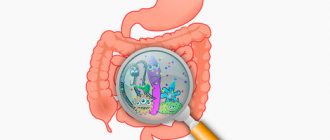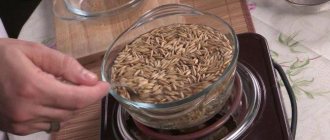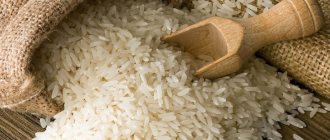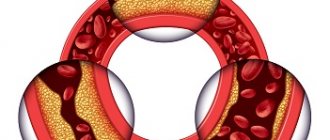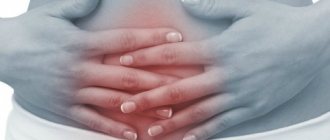Vitamins for the liver are low-molecular substances that support the full functioning of the hepatobiliary system. These compounds accelerate the regeneration of damaged tissues, normalize the secretory-evacuatory function of the gallbladder, transform free radicals into safe products, improve metabolism, and enhance the hepatoprotective effect of herbal ingredients.
To maintain the liver’s ability to heal itself, it is important to take a complex of vitamins 1-2 times a year.
Why does the liver need nutrients?
Content:
- Why does the liver need nutrients?
- What vitamins should I pay attention to?
- Vitamin preparations
- Common misconceptions about the liver
- conclusions
The liver is the most important gland of the digestive system, on the condition of which the functioning of all internal organs depends. It performs about 500 vital functions, and more than a trillion biochemical reactions (per second) take place in its parenchyma.
The main “tasks” of the liver are purification of the blood from exogenous and endogenous toxins, activation of bile acids, regulation of metabolism, production of protective immunoglobulins, glycogen deposition, and nutrient metabolism. However, under the influence of damaging factors (bad eating habits, drug intoxication, parasitic infestations, congestive inflammatory processes), metabolic-reduction reactions in the gland are disrupted, as a result of which harmful poisons settle in the tissues of the organ. This phenomenon serves as a trigger for the development of various functional disorders (hormonal imbalances, autoimmune diseases, endocrine disorders, digestive pathologies).
Signs of liver slagging:
- frequent depression;
- pain in the right hypochondrium;
- dark urine;
- skin rashes (including age spots, pimples, red spots);
- allergic reactions;
- headaches, migraines;
- sallow or yellowish skin tone;
- nausea, belching, bad breath, unpleasant smell of sweat;
- bitterness in the mouth;
- dark circles under the eyes.
If any of these symptoms are present, it is important to begin detoxification measures immediately.
To do this, water (2.5 liters per day), pectin sorbents, hepatoprotective and vitamin complexes are introduced into the diet. In addition, to diagnose the pathological process, they consult a gastroenterologist.
What does a lack of B vitamins lead to?
So, we found out that B vitamins contribute to the normal functioning of all body systems, and therefore their deficiency can lead to a number of health problems. Adverse symptoms include:
- disturbances in the functioning of the nervous system;
- poor condition of skin, hair, nails;
- muscle weakness;
- joint pain;
- numbness of the limbs;
- labored breathing;
- fatigue during physical activity, rapid heartbeat;
- insomnia;
- loss of appetite;
- dizziness.
As a rule, these symptoms appear in a complex, and only a competent specialist is able to determine the correct cause of the ailment.
Often, bad habits (smoking, frequent drinking of alcohol and caffeine) and improper daily routine (lack of sleep, overwork) lead to a lack of B vitamins. The doctor takes these factors into account when making a diagnosis.
What vitamins should I pay attention to?
Remember, even with severe destruction, the liver does not hurt (due to the absence of nerve receptors). Therefore, do not bring the organ to self-destruction; it will not “ask” for help.
Conduct preventive courses regularly twice a year.
To improve metabolic and recovery processes in hepatocytes, it is important to saturate the body with essential substances.
What vitamins are good for the liver?
- Vitamin A (retinol). Participates in the processes of glucose deposition (in the liver), regulates the production of cholesterol, accelerates the regeneration of cellular structures (including hepatocytes), and stimulates the secretion of bile. The daily norm is 0.7 milligrams.
The fat-soluble nutrient is found in orange vegetables and fruits, root vegetables, leafy greens, and dried fruits.
Attention, retinol preparations can only be taken after consultation with a therapist (since, in 50% of cases, they have a toxic load on the body).
- Vitamin E (tocopherol). Maintains the integrity of liver cell membranes (due to the transformation of free radicals into safe compounds), stimulates the synthesis of dolichols (cells that accelerate the regeneration of hepatocytes), controls the production of sex hormones, and regulates lipid metabolism. The physiological need for the substance is 25 milligrams.
Tocopherol is found in wheat sprouts, fermented milk products (cheese, cottage cheese), eggs, unrefined vegetable oils (pumpkin, flax, soy, camelina).
- Vitamin K (phylloquinone). Improves blood clotting, accelerates the regeneration of liver tissue, stimulates bile secretion.
Food sources - spinach, white cabbage, eggs, lettuce, milk, blackberries, rowan, corn, mint, rose hips.
The need for the substance varies between 0.1 - 0.3 milligrams. If hepatitis or cirrhosis of the liver is present, the daily portion of the substance is increased to 0.4 - 0.5 milligrams.
- Vitamin C (L-ascorbate). Reduces the risk of developing fatty liver (by reducing low-density lipoproteins), prevents the destruction of hepatocytes (by neutralizing free radicals), increases the bioavailability of vitamins A and E. For proper functioning of the organ, consume 1500 milligrams of L-ascorbic acid per day (distributed over 5 – 7 techniques).
The antioxidant is found in sauerkraut, rose hips, parsley, cranberries, lingonberries, and citrus fruits (without heat treatment).
- Vitamin B1 (thiamine). Accelerates the removal of excess lipids from the liver, participates in the synthesis of proteins, fats and carbohydrates, stimulates the restoration of cellular structures. The physiological need for the element is 1.1 milligrams per day. With a prolonged lack of substance in the body, in 70% of cases, liver failure develops.
Thiamine is concentrated in wheat germ, bran, seeds (sesame, sunflower), leafy greens (parsley, dill, cilantro), hazelnuts, cereals (green buckwheat, brown rice).
- Vitamin B2 (riboflavin). Stimulates the secretion of bile, accelerates recovery processes in liver cells, participates in the formation of glycogen, protects the gland from oxidative stress. The daily norm is 1.3 milligrams. Natural sources - almonds, eggs, buckwheat, cottage cheese, milk, meat.
Remember, uncontrolled intake of riboflavin leads to fatty liver.
- Vitamin B4 (choline). Reduces the concentration of harmful triglycerides (low density) in the gland, restores cell membranes (after inflammatory diseases), reduces cholesterol levels in the blood, increases bile secretion, improves lipid metabolism. For the gland to function properly, it is important to consume at least 500 milligrams of the nutrient per day.
Foods rich in choline - egg yolk (soft-boiled), cottage cheese (fat), cheese, dates
(without processing), sour cream.
- Vitamin B6 (pyridoxine). Regulates enzymatic reactions, improves the contractile-evacuation function of the gallbladder, prevents the accumulation of triglycerides in the liver, and inhibits the formation of homocysteine (toxic metabolic metabolites). The daily norm is 2 – 5 milligrams.
Pyridoxine is found in nuts (hazelnuts, almonds, walnuts), eggs, seafood (shrimp, fish, oysters), vegetables (potatoes, cabbage, tomatoes), legumes (beans, lentils, soy).
- Vitamin B8 (inositol). Activates lipid metabolism, dissolves excess cholesterol, facilitates the outflow of bile, strengthens hepatocyte membranes, and prevents the development of liver cirrhosis. The daily dose of inositol varies from 1000 to 1500 milligrams.
The nutrient is found in wheat bran, oatmeal, peanuts, wild rice, cabbage, carrots, raisins, lentils, grapefruit, and green peas.
- Vitamin N (lipoic acid). Regulates lipid and carbohydrate metabolism, improves the nutrition of nerve cells, restores hepatocyte membranes, neutralizes toxic metabolic products, prevents fatty liver degeneration (by increasing the synthesis of protective lipoproteins and normalizing enzyme activity). To prevent functional disorders, consume 50–75 milligrams of the substance per day, and to treat metabolic disorders – 200–400 milligrams.
Lipoic acid is concentrated in unpolished rice, lentils, green buckwheat, oatmeal, flax seeds, meat, white cabbage, and spinach.
To improve liver function, it is important to consume magnesium, zinc, copper and selenium.
Can I have something sweet?
Everyone knows about the pancreas, which produces insulin that breaks down glucose, and the liver also does not stand aside from this process; it is an active participant in regulating glucose levels. When there is a lot of sugar in the blood, the liver snatches glucose from the blood and makes glycogen from it, which is stored in the cells for the time being. As soon as the blood sugar level drops, glycogen returns to its original state and is sent into the blood as glucose. The liver also makes glucose from other available means - amino acids.
With hepatitis, the process of working with glucose is disrupted, and glucose is not just sugar in the blood, it is the energy for igniting all biochemical processes. In chronic liver pathology, there are signs of combined energy and protein malnutrition. We dealt with proteins above - you need to increase their consumption, but it’s better to hold off on sweets. The liver will not be able to actively work with excess glucose in order to store it, just as during fasting it is not able to instantly transfer glycogen from the depot into the blood with freshly prepared glucose. And making enough glucose from amino acids is also problematic.
Therefore, sweets are not forbidden, but in moderation. It’s better to be natural so that the stove doesn’t strain itself. Natural sugar is stored in fruits, but not in juices, because juices are a concentrate of excess sweetness diluted in water. It can be dried, but not candied or covered in chocolate.
Vitamin preparations
To prevent disorders of the hepatobiliary system, it is important to regularly consume vitamin complexes (2 times a year).
TOP 5 best drugs for the liver
- “Liver asset Nutrilite” (Amway, Russia). Combined phytocomplex to improve metabolic processes in the gland and prevent congestion in the hepatobiliary system. The drug contains plant extracts (milk thistle, dandelion, acerola), vitamins (B1, B2, B3, B5, B12), citrus flavonoids (lemon, grapefruit).
The complex is taken 2 times a day, 1 capsule.
- "Liver Optimizer" (Jarrow Formulas, USA). An organic multicomponent composition aimed at detoxifying the organ, normalizing metabolic processes in hepatocytes, and increasing bile secretion. The drug includes herbal extracts (milk thistle, Japanese coptis, purslane), vitamins (B1, B6, , N), amino acid (L-cysteine).
Dosage regimen: 1 tablet per day 5 – 15 minutes before meals.
- "Gepatrin" (Evalar, Russia). A biologically active food supplement that has hepatoprotective, choleretic, detoxifying and antioxidant effects on the digestive tract. Active components - vitamins (E, B1, B2, B6), herbal extracts (milk thistle and artichoke), phospholipids (lecithin).
"Hepatrin" is taken 1 capsule twice a day (10 minutes before breakfast and dinner).
- “Heparoz forte” (Spring of Health, Russia). A powerful phytocomposition for restoring liver function (especially after hepatitis), normalizing the composition of bile, relieving inflammatory phenomena in the gland (for dyskinesias, cholecystitis, parasitosis). The supplement contains 6 plant extracts (dandelion, grape seed, hodgepodge, corn silk, milk thistle, rose hips), 11 vitamins (A, E, C, , , H, B1, B2, , B6, , B12), 7 minerals (zinc , manganese, calcium, iron, magnesium, copper, potassium).
When the liver cannot cope with the toxic load, carcinogens enter the blood without purification.
The drug is consumed three times a day, 1 capsule (during meals).
- "Gepaton-2" (Art-life, Russia). A natural multicomponent composition that improves the detoxification, metabolic and exocrine functions of the liver. In addition, the drug stimulates anaerobic metabolic processes, increases blood supply to internal organs, reduces cholesterol levels in the blood, increases the regeneration of damaged tissues, and stabilizes the activity of the endocrine glands. Components of the drug - vitamins (A, B1, B2, B5, B6, D3, N, B7, B9, B12, PP, C, E), plant extracts (hill solyanka, immortelle, milkweed, yarrow, mint, burdock, beets, rosehip, St. John's wort, dandelion, tansy), amino acids (L-glutamine, glutathione, methionine), phospholipids (lecithin). Dosage regimen: 2 tablets twice a day 5 – 20 minutes before meals.
The period of greatest liver activity is from February 10 to May 18. To obtain the maximum “effect”, the selected composition is taken for the specified period.
Not all drugs are created equal—what dangers should you be aware of?
There are no absolutely safe medications, be they chemicals, herbs or dietary supplements. Under certain conditions, all of them can damage the liver. We will talk about the most common drugs and the consequences of taking them.
- Anti-inflammatory drugs - paracetamol, nurofen, diclofenac sodium, aspirin and other drugs from the NSAID group. There are hundreds of names, thousands of combinations. Everything you run to the pharmacy for when you have a headache, a sore back, aching joints, or a fever. Every fifth inhabitant of the Earth takes these drugs. And all of them are toxic to the liver. Moreover, the harm depends on the dose, and the consequences develop from asymptomatic drug-induced hepatitis to severe liver failure.
- Antibiotics are the “heavy artillery” of modern medicine. They have saved millions of lives and can save them from bacterial infections. However, they are often used without reason, for “prevention”. Or patients “prescribe them” to themselves. And the liver pays for everything. Antibiotics, depending on their chemical structure, can harm the liver in different ways. Some cause damage to the cell membranes of liver cells, others disrupt the outflow of bile and thicken it, and others cause a malfunction in the immune system when it begins to attack and destroy its own liver. Often several negative effects are combined in one antibiotic. Particularly dangerous for the liver: amoxicillin + clavulanic acid, rifampicin, erythromycin, tetracyclines. You may feel the consequences of taking them even after stopping the medications. The larger the dose and the longer the course, the more attentive you should be to your condition. Never use these drugs without good reason.
- Medicines that lower blood pressure are antihypertensives. More than half of the population over 60 years of age suffers from high blood pressure. Every third person does not know about this. And, of course, there is no cure. Those who take the drugs prevent complications of hypertension - heart attacks, strokes and kidney failure. Drugs used to treat hypertension generally rarely cause liver damage. The exception is hydralazine and methyldopa, which cause drug-induced hepatitis. However, you should not combine even relatively safe medications for hypertension with alcohol, or take them “in a hurry.” The exact dose and regularity of administration are the key to successful treatment.
- Contraceptives. It was they who made a splash 50 years ago, giving freedom of choice. It would seem so convenient - you can survive “critical days” without painkillers, and protect yourself from unwanted pregnancy, and prevent uterine and breast cancer. And all at the same time! All you have to do is take a small tablet in the morning. However, hormonal contraceptives are not so harmless. In addition to the risk of thrombosis, a couple of extra pounds, and mood swings, the liver also suffers greatly from them. A tendency to stagnation of bile and stones, the risk of the formation of a benign tumor in the liver - adenoma, and even damage to liver cells - this is what the liver “pays for” for your quiet life. And those whose liver is initially not in order should not take contraceptives without consulting a hepatologist. Therefore, do not assign them to yourself. And don't take it for long.
- Antiallergic medications. There are more and more people with allergies every year. In Russia, almost half of those who suffer from unusual, too strong reactions to ordinary factors (namely, this is considered an allergy). Asthma affects every 12th Russian. Allergy medications are among the most sought after in the world. Allergies and liver function are closely related. The cause of allergies is precisely the disruption of the neutralization of toxins by the liver and the launch of immune reactions to “attack” one’s own body. Therefore, suppressing allergy symptoms and loading the liver with medications will not cure allergies. Although antiallergic drugs themselves generally cause little harm to the liver. This is especially true for the latest generation of drugs that are taken once a day. However, allergy medicine should be prescribed by a doctor and only after examination. This is an axiom.
Whatever you take, even safe valerian, remember: the liver is strong, but vulnerable. Don’t waste its resource by swallowing a handful of tablets, it will give you a slight headache. Find out why.
Who needs to be extremely careful with any medications?
Damage to the liver from taking medications depends on several factors - the drug itself, the condition of the body, and others.
A. Medicine - the longer you take it, the greater the harm. Therefore, if you have a chronic pathology, your doctor should choose the least toxic medicine for you. Toxicity directly depends on the dose. In addition, the route of administration is important: if the substance immediately enters the bloodstream, the effect will be maximum. And, the more medications, the more damage to the liver.
B. State of health - what is important, first of all, is gender, age, genetic characteristics of liver enzyme systems, and what diseases there are. The liver is most vulnerable in women, children under 3 years of age and in everyone over 40. Those who have suffered acute or have chronic liver disease - viral, autoimmune, toxic hepatitis, alcoholic liver disease, steatosis, diabetes, fibrosis, cirrhosis and others - are also in group at risk of drug-induced liver damage. If you are overweight, there is also excess fat in the liver, which is more difficult to cope with the load due to fatty hepatosis.
Other factors
The metabolism of drugs is also affected by pregnancy, chronic stress, dietary habits (irregular, lacking vitamins, protein, and a lot of saturated fat), alcohol - all this must be taken into account when prescribing medications.
For example, if you take medications with citrus juices, the toxicity of the medications increases. Taking coffee with a popular asthma medication can cause caffeine poisoning. Medicines should only be taken with plain water!
How to recognize danger when you are taking medications?
Are you taking medications and you begin to feel weak, nauseous, have lost your appetite, your urine has become darker, your stool has become lighter, and your skin has turned yellow? Even one of these signs is a reason to immediately consult a doctor. If you take medications for a long time, it makes sense to be examined periodically, even if nothing bothers you. This is the only way you will find out in time what you can do to help your liver.
Here is a list of recommended examinations that will allow you to determine early whether the liver is healthy:
- examination and examination by a hepatologist
- tests: general blood and urine analysis, biochemistry: ALT, AST, GGTP, alkaline phosphatase, bilirubin, protein fractions, lipid profile, glycosylated hemoglobin
- studies: ultrasound of the abdominal organs and elastography of the liver
You can undergo an examination and find out everything about the condition of your liver and the risks of taking medications in just 1 day. If these data reveal deviations, it is worth doing a more detailed examination. Experienced specialists at EXPERT Polyclinic are ready to give you maximum information about your condition. And also a forecast of how your liver will feel in the future, and recommend competent treatment to protect it.
Common misconceptions about the liver
Myth No. 1 “If you don’t abuse alcohol, your liver will be fine. No vitamins needed"
This is an erroneous opinion, since fatty, high-carbohydrate foods, fast food and sweets harm the gland no less than alcohol. To utilize “heavy” food, the body increases the synthesis of enzymes, which leads to a change in the composition of bile, disruption of the production of pancreatic juice, and overload of liver cells with triglycerides.
With regular intake of junk food, low-density lipoproteins gradually accumulate in the organ, forming fatty hepatosis (fatty degeneration). Against the background of liver infiltration, an inflammatory process (steatohepatitis) develops, accompanied by partial death of hepatocytes. If the pathology is not stopped for a long time, the liver tissue is replaced by connective tissue, and a harbinger of cirrhosis develops - fibrosis.
In addition, the functional state of the gland deteriorates due to the use of synthetic drugs, inhalation of carcinogenic substances (nicotine, insecticides, paints), and the entry of pathogenic invasions (viruses, bacteria, fungi) into the body.
To speed up the recovery processes in the iron, it is important for every person to consume vitamin complexes for the liver.
Myth No. 2 “Hepatoprotective supplements should be taken only for pain in the right hypochondrium”
A common misconception. Considering that there are no pain receptors in the liver parenchyma, even serious diseases (hepatitis, tumors), in 80% of cases, are asymptomatic. Pain in the right side indicates “problems” with the biliary system or pancreas. To restore hepatocyte membranes (at different stages of damage) during the three spring months, it is advisable to take hepatoprotectors.
Myth No. 3 “Herbal supplements will “cope” with any liver disease”
This is wrong. Vitamin complexes are not an alternative to drug treatment, but an addition to it. These compositions are used for the prevention and correction of minor functional disorders of the hepatobiliary system (cholecystitis, dyskinesia, inflammation, transient toxicosis, pancreatitis). In case of severe organ damage (hepatosis, cirrhosis, hepatitis, fibrosis), supplements are taken together with drug therapy.
Myth No. 4 “The liver needs to be cleaned regularly”
Dangerous misconception. If the liver is healthy, it is able to cleanse itself. Procedures aimed at emptying the gallbladder (tubes, probing) can only be carried out after consultation with a gastroenterologist and an ultrasound examination. Otherwise, you can provoke the movement of stones, which, when they enter the bile duct, damage its internal surface. At the same time, the person experiences unbearable pain (since the gallbladder is dotted with pain receptors).
Remember, the liver should not be cleaned, but “fed” with hepatoprotectors!
What to do then
It is unlikely that the patient will do something that is incomprehensible and difficult for him. A person with hepatitis will not constantly limit himself, checking the list of “dos and don’ts”, because fixation on the disease and helplessness are also suffering, and he already has one big and lifelong problem - hepatitis.
A patient with hepatitis needs to understand what function the liver is not able to fully perform, and from this, consciously select a personal diet, focusing only on their preferences, and not on the recommendations of nutritionists.
When you don’t like fish all your life, its usefulness does not matter, because you are not going to eat it. Eating something you’ve never eaten or don’t like will only cause you pain.
"Hepatrin" from the domestic
You may be interested in: The best vitamins: reviews from doctors about popular drugs
Useful vitamins for the liver, which have detoxifying, choleretic, hepatoprotective and antioxidant effects. The cost of one package, which is enough for a month of use, is about four hundred rubles.
The composition contains the following components:
- milk thistle extract;
- artichoke extract;
- tocopherol (vitamin E for the liver);
- essential phospholipids (in small quantities);
- vitamins A, B1, B2, B6.
Take one capsule on an empty stomach, ten minutes before meals. Two or three times a day. If the drug is prescribed by a hepatologist or gastroenterologist, the dose may be higher and this should not alarm the patient, since with some diagnoses the need for vitamins increases.
How do components for synthesis and finished vitamins get into the liver?
The body obtains most vitamins from food. Before entering the cells, they undergo “control” and refinement in hepatocytes. The absorption of essential and toxic substances is ensured by the small intestine. By flowing into the portal vein, they enter the liver cells (hepatocytes), and only after changes are sent into the general bloodstream.
The liver receives 80% of its blood through the portal vein. Its composition is mixed, since it contains both arterial and venous blood from the gastrointestinal tract. The capillary network is called “miraculous” because, unlike other organs, it is formed from two systems:
- one, ordinary, forms a communication between the arterioles of the hepatic artery and the veins;
- the other consists only of the capillaries of the portal vein.
They are connected to each other by anastomoses and, if necessary, “help” each other. Thus, nature has resolved the issue of protecting the liver parenchyma from problems with the supply of oxygen and materials for biochemical transformations.

